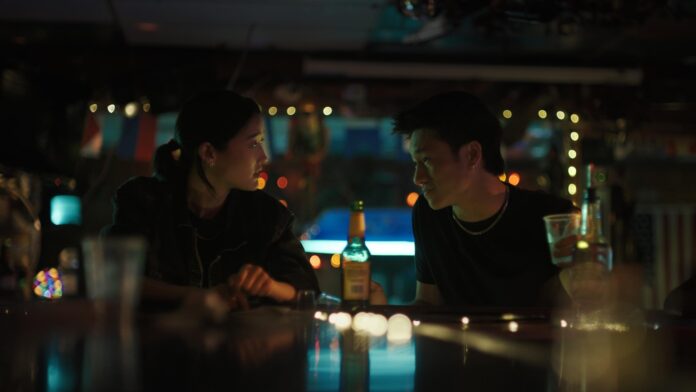From debuting writer-director Jing Ai Ng, Forge is a tale of precious-but-precarious family bonds, set against the backdrop of art crimes in Miami. It’s deliberate in its drama, but languorous in its unveiling, taking its sweet time to put its pieces together despite tipping its hand for the audience in advance.
The film is bookended by impeccably crafted sequences, each filled with immense tension. However, at nearly two hours in length, it sags in between, with scenes that extend far beyond their natural life, if only because its leading duo strains to tap into the familial and cultural themes, towards which the movie limply gestures.
It opens with a tongue-in-cheek fine art hustle in a seedy Miami motel, during which college-aged forger Coco Zhang (Andie Ju) gradually convinces a white art dealer that she knows nothing about the supposedly precious painting left to her by her aunt. As her twin brother Raymond (Brandon Soo Hoo) keeps watch on her room from afar, the old family pictures she’s neatly placed on the nightstand convince the dealer that she can be short-changed, for a painting he believes to be worth at least six figures.
By feigning ignorance, and by flipping the tables of racist assumptions, the siblings walk away with $20,000 in exchange for an expert fake. This scene not only introduces their skills and their dynamic in engaging fashion, but works as a microcosm of the movie’s larger plot. Raymond, the brains of their operation, works a day job at a fancy resort, where he’s contacted by rich, white trust fund kid Holden Beaumont (Edmund Donovan) to pull off a similar scam on a larger scale. He’s reluctant, but Coco—sick of working in the kitchen at their family’s restaurant—manipulates him into partaking in ways he doesn’t realize, setting up future tensions between them.
Raymond is ambitious, but anxious. Coco is quiet, but schemes in silence. They balance each other perfectly. However, a wrinkle emerges—practically by coincidence—when FBI art crimes agent Emily Lee (Kelly Marie Tran) comes to town on unrelated business. It just so happens that she has dinner at the restaurant owned by the twins’ family, where she meets their kindly immigrant mother, and crosses paths with the duo too. However, at no point does this happenstance create a meaningful connection between Emily and the twins, which might complicate her inevitable discovery of their plot.
What’s more, the film features several extraneous scenes of Emily gradually sleuthing for information once she learns of the ongoing forgeries, but sitting in silence as she struggles to put the pieces together. There’s little sense that this is a complicated puzzle, no matter how much Tran furrows her brow. Rather, it involves information coming Emily’s way in a manner that makes her passive. There just isn’t enough for her to do in Forge, despite having to contend with the racism and sexism of the white men in her department.
Tran is an incredibly capable actress, so she works to create connections between Emily’s cultural struggles—as an Asian American woman in a largely white male profession—and those of the other characters, even when the movie only suggests them in the most superficial terms. There’s little binding her to the twins and their family, which robs her eventual dilemma of weight, and there’s even less by way of actual personality or backstory to Emily beyond her job, and her art history degree. But you can always see the wheels turning in Tran’s head. She’s consistently magnetic, though unfortunately, Ju and Soo Hoo are saddled with function-first dialogue that turns their characters into exposition machines, even when they’re discussing their relationship.
The result is a film that jogs in place for lengthy periods, thanks to emotionally unconvincing drama between its leads, and scenes that go on endlessly, only to find dead air. Its heist elements have the appearance of focusing on Coco’s process, but this usually comes down to her explaining her methods of forgery, rather than us getting to see them up close, or experience the clockwork thrill alongside her (à la the TV series White Collar). The movie’s conception of Miami as a lonely, transient space is wonderfully affecting—kudos to cinematographer Leo Purman—but the way the characters relate to this space is seldom externalized.
Near the end of Forge, the mutual recognition the movie’s leads find in each other’s struggles yields moments of remarkable dramatic potential. There’s meaningful intimacy to it, but it’s built on a shaky foundation. It can’t help but feel too little, too late.

